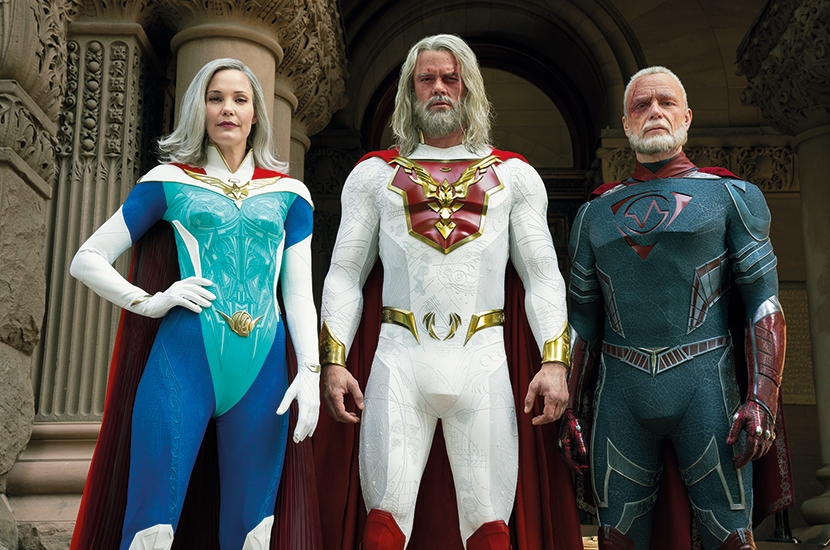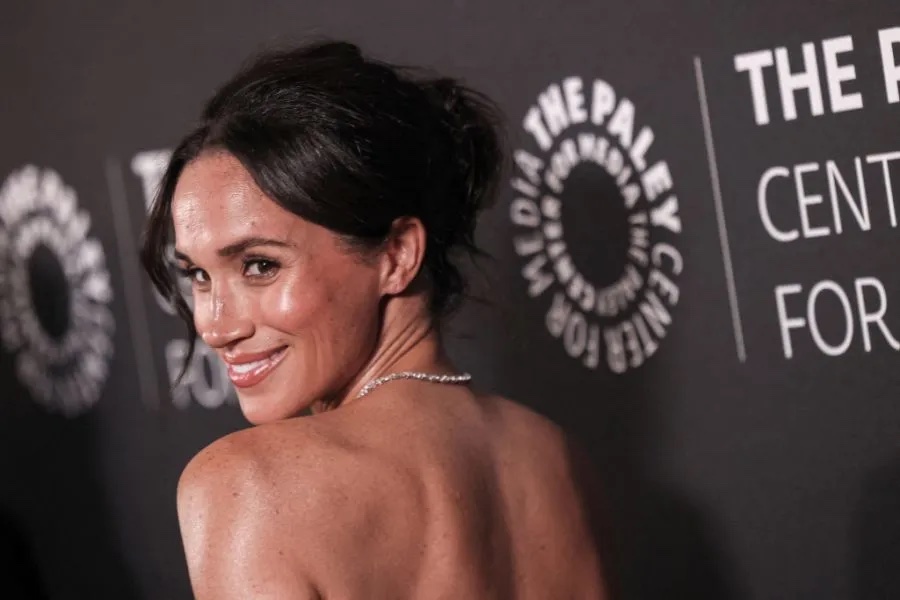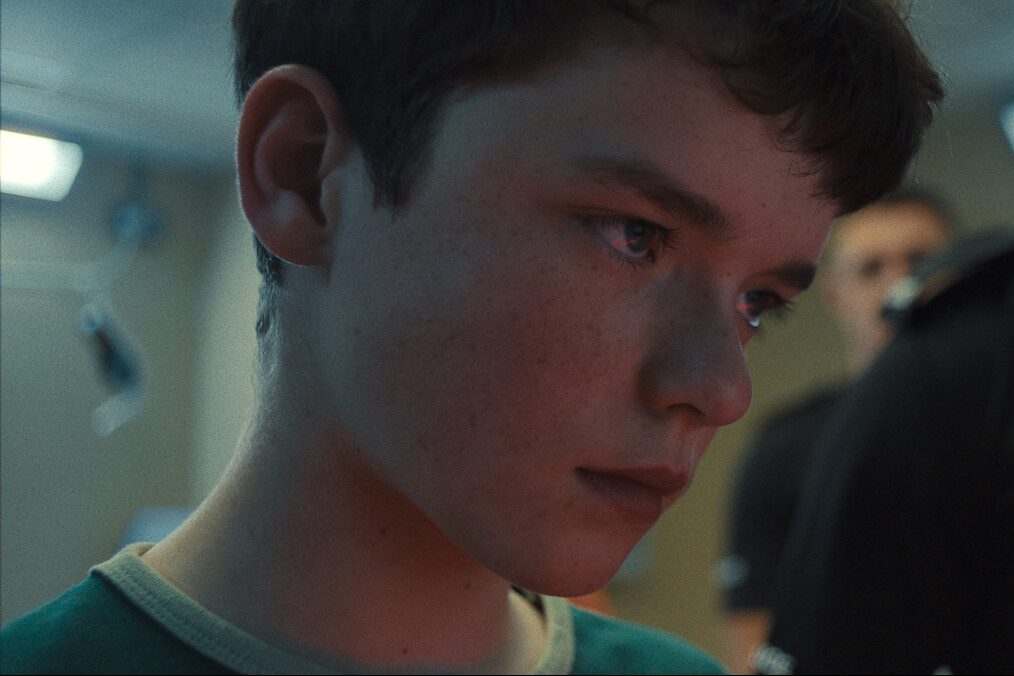Mark Millar has a raging hangover but he couldn’t be more chirpy or enthusiastic. ‘People say they get worse as you get older but I get reverse hangovers where I feel amazing. I wake up at four or five and I’m ready to go!’
I’ve caught him on a Sunday morning, on his way to Mass, after an exhausting three weeks in which he has been doing up to 45 interviews a day to promote Jupiter’s Legacy, his blockbuster superhero series for Netflix. He ought to be nervous: this is his first big project off the blocks since (in 2017) the studio bought up his publishing company Millarworld for a reported $50-100 million. Instead, as ever, he’s fizzing with energy, enthusiasm and optimism.
The reason, he explains, is that he was born with a kind of superpower. ‘I’ve never felt I could fail,’ he says, comparing his boundless self-confidence to that of the second world war fighter ace Douglas Bader ‘who never felt like he was going to die up in the plane because he was Douglas Bader’.
Having a warm, loving, supportive family helped too. ‘Although we were from a poor working-class community [on an estate in Coatbridge, outside Glasgow] — Mum was a cleaner, Dad a steelworker — there was always an incredible optimism and joy in everything. No one ever said to me it’s time to grow up.’
Even his older siblings were like a league of superheroes, each with their own special power. ‘One has got incredible business acumen; another one loves showbiz; another is very, very social and everyone in town knows him.’ When Mark showed an interest in a career in comic books (he made his first ones at five), his family all rallied round rather than telling him to knuckle down and get a proper job.
So for 10 years, from the age of 19, Millar worked as a writer for comics like 2000AD, earning just enough money to ensure he could party every night. Just as his career seemed to be going nowhere, and he was considering a move into TV scriptwriting, someone handed him an assignment that would be his last shot at comic books. It was a ‘naughty version’ of Justice League called The Authority.
For a change, Millar decided to write the kind of comic book he’d like to read himself rather than the one he felt he ought to write. ‘It was outrageous: supervillains having sex with corpses; abortions with superpowers. It was also a MASSIVE hit.’
On the strength of The Authority’s success, Millar was recruited by Marvel — then on the brink of bankruptcy — to revamp its comic-book back catalogue, which included X-Men and the Avengers. Millar was so successful that these subsequently became massive movie franchises. In one storyline, he had the character of Nick Fury drawn — without the actor’s permission — to look like Samuel L. Jackson. A decade later, after Jackson had been signed up to play the role, Millar met him and said: ‘Sorry for stealing your face.’ Jackson replied: ‘Thanks for the nine-picture movie deal, motherfucker!’
By 2004 he felt secure enough to go independent and launched Millarworld, which yielded a string of comic book-to-movie hits including Wanted (starring Angelina Jolie), Kick-Ass and Kingsman. No studio wanted to touch Kick-Ass (they were especially put off by the sweary, pubescent killer called Hit Girl — subsequently to be played by Chloë Grace Moretz), so his friend, the director Matthew Vaughn, did the unthinkable and financed it himself. It cost $28 million and earned $240 million. Point proved.
Though Millar considers himself a hard-left Corbynista and supports the idea of massive wealth redistribution he’s also a great believer in the power of the market. What the market is telling TV and producers right now, he believes, is that audiences don’t want woke; they want edgy, entertaining, dark, surreal and subversive. In the superhero genre, he cites the blackly cynical Deadpool (which made $850 million. Millar loves talking budgets and grosses); and his friend Garth Ennis’s bleak and ultra gory The Boys, which pulled at least 40 million viewers on Amazon.
While his own Jupiter’s Legacy (and its sequel Jupiter’s Circle) isn’t as nihilistic or snarkily postmodern as The Boys, it still feels daringly different — not least because of the powerful moral fable lurking beneath the drugs and violence. Its hero, the Utopian, is a God-fearing Christian who insists his family say grace before meals and binds his fellow superheroes to a rigid code that forbids them from killing, no matter how evil and destructive their enemies might be. He’s so worthy, indeed, that he threatens to become a bit of a bore. Only after many episodes will we get to see just how right Utopian is — and how wrong his critics.
‘I’m completely traditional,’ says Millar, recalling the time when he shocked a Hollywood dinner party — ‘there were atheists and Buddhists and a couple of Satanists’ —by admitting to being a Mass-going Catholic. ‘Everyone was open-mouthed, even the Satanists. The one thing you’re not allowed to be in Hollywood is traditional.’
When Christianity is depicted on screen, he says, it’s invariably ‘stern, with someone quoting from the Bible and then slapping you’. But Millar finds nothing but joy in his Catholic faith. ‘All my pals growing up were altar boys, which could have been quite difficult on a rough housing estate, but we all got on, a real mix of people. I was into Basil Rathbone; another of my friends was into stealing cars all the time.’
It goes some way to explaining the unusual range of tone and mood in Millar’s work, ranging from gleeful irresponsibility and a puerile love of outrageous violence to mature, meditative moral philosophy. ‘I quite like wrongfooting everyone. People think they’ve got you pigeonholed and then you go: “No no no. I can also do this…”’ Entertainment, though, he believes, should be paramount. When he wrote Kingsman, for example, he was trying to recreate the playful spirit of the early James Bond movies. ‘That Bank Holiday Monday ITV feeling, rather than that suicidal feeling you get after watching one of those moody Daniel Craig numbers. When I was a boy I used to sleep with a toy gun under my pillow because that’s what James Bond did. Today we seem to be missing those male action heroes — where are the John McClanes, the Rambos? — and I want to create lots more.’
He’s extraordinarily prolific: where does it all come from? It sounds pretentious, he says, ‘but it’s a bit like having a séance. The stories are out there in the ether, wanting to be told, waiting to be born — and you just have to tap into that.’ All ideas have their moment, he thinks, which is why creatives often come up with the same ideas simultaneously but independently of one another. His inspiration feels inexhaustible. ‘I could sit down today and if I thought about it I could come up with three franchises.’ He has always admired creatives who can do more than one thing. ‘Ian Fleming didn’t just do James Bond, he also did Man From Uncle and Chitty Chitty Bang Bang, so that’s three things, which is pretty awesome. But what really blew me away was when I learned that Stan Lee had created 15 big ones.’
Stan Lee, creator — inter alia — of Spider-Man, the X-Men, Iron Man, Thor and the Hulk is one of Millar’s greatest heroes. ‘He always worked standing up — he had created one of those standing-up desks back in the 1940s — and he lived till he was 95. I like that enthusiasm. It keeps you 20 years younger.’
This article was originally published in The Spectator’s UK magazine. Subscribe to the World edition here.

























